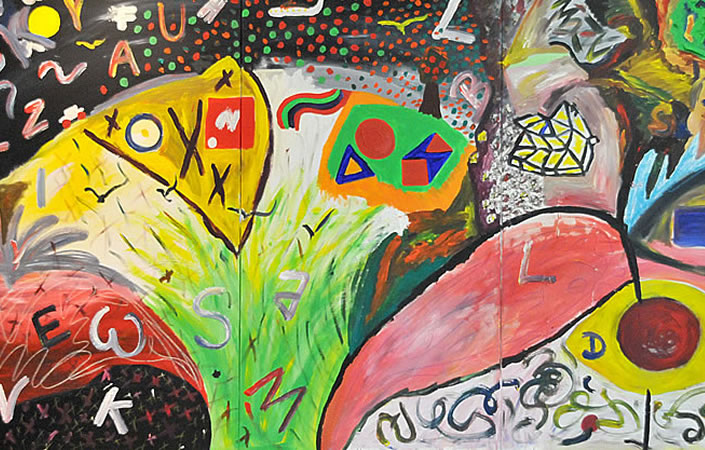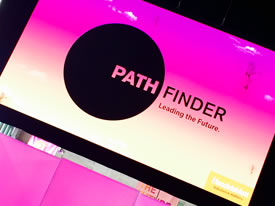25. February 2016

In Berlin, people are queueing up to see an exhibition comparing expressionist and impressionist painting. It is a very regulated experience of art: this is well established, known art. There will not be any exceeding challenges, irritations or surprises. Here, on the other hand, it is quiet and empty. Nobody knows yet what these sculptures and performances might have to say. These sculptures have not yet been classified and are on display without a commentary. The exhibition in Berlin puts the spotlight on something that is known and has been evaluated. We, on the other hand, are encountering something different here: openness and the undefined. We have to find our own position; there is no official interpretation to relieve us of having to have the courage of our own opinion. We have to give our own judgement.
Companies are nowadays almost desperately searching for innovation, vibrancy, creativity and agility. Such places as these here can show us the prerequisite: the ability to open up for something that has not yet been tested, which is definitely not »more of the same«: something provocatively different. Something that instigates conflict, causes uncertainty and that is risky to evaluate.
This kind of context allows for new experiences and may give way to new perspectives. These visits are a metaphor for companies. They demand some distance from the tried and tested. That is one of the reasons I love these places. Here, I can feel that I also have the right to stand in front of a sculpture and be utterly clueless as to what it might tell me. And to then go on to discover another one that opens up a new perspective.
What does that have to do with companies, you might ask. I still experience companies attempting to be transnational – often successfully so. Leadership is considered to be a globally defined behaviour, the approach is inclusive. Groups from a wide range of cultures are learning to apply this model behaviour. However, while companies may be transnational and culturally global, the markets are multinational and are in fact in the process of becoming even more »multi« and diverse again. Like the pieces of art in this space, they contain difference, surprise, strangeness and sometimes provocation.
In my extensive travels throughout Asia and my encounters with many people at work, I have learned that we need to concentrate more on »multi« than on »trans« or »mono«. By retreating into trusted knowledge and established patterns, we will never meet the diverse otherness of cultures and ways of life. Our introverted orientation will fail to direct us to the dynamics of our dazzlingly diverse world and its needs.
Let us return to innovation, agility, flexibility: in order to be able to create a culture of openness, one must expose oneself to the new and yet uninscribed and allow it into our midst. Of course there are things I do not understand, things that leave me clueless and looking for what I know – and yet at the same time I am aware that it is these very encounters with the »other than I« that give me an understanding of difference. I realize that it takes internal difference for us to be able to cope with the diversity of the outside, which requires vibrant and creative adaptation.
Rüdiger Müngersdorff
8. May 2015
 CEOs chose a forward-looking topic, nominated speakers and about a hundred talents each from their own organization to meet in an aeroplane hangar at the former airport Tempelhof in Berlin on Labour Day. It was a successful idea, and there was a passionate host: Gabor Steingart, CEO of the Handelsblatt publishing group.
CEOs chose a forward-looking topic, nominated speakers and about a hundred talents each from their own organization to meet in an aeroplane hangar at the former airport Tempelhof in Berlin on Labour Day. It was a successful idea, and there was a passionate host: Gabor Steingart, CEO of the Handelsblatt publishing group.
SYNNECTA participated as a guest. It was a good opportunity for SYNNECTA to see clients once again and meet the next generation as well as encountering familiar topics and pioneers.
The CEO of Bayer AG Marijn Dekkers announced risk researcher Ortwin Renn from Stuttgart, who gave a lively and knowledgeable explanation that innovation needs a culture of readiness to assume risk. He also described how the augmentation of individual risks by media leads us to seriously overestimate these while we underestimate and partly displace other real, but abstract, risks – such as global warming. The chairman of the supervisory board of Daimler AG, Manfred Bischoff, had invited physicist Michael Feindt from Karlsruhe to speak on algorisms and automated decisions that decisively raise the quality of decision-making for all repetitive decisions. However, this does not apply for strategic decisions on the way to the future, for which we cannot make use of existing data. No amount of data collection ascertainment of decisions can replace »gut instinct« there.
Jürgen Fitschen, Co-CEO of Deutsche Bank had chosen the topic trust and invited extreme climber and businessman Stefan Glowacz. He gave an authentic presentation at hand of the story of three attempts at a first ascent of a mountain in Patagonia that showed how many dimensions of trust come together to make possible the performance of an extreme achievement under extreme conditions. There is trust in one’s own plans, the material and the team as well as trust in the goal as the decisive motivator above all. Johannes Teyssen, CEO of E.ON had selected the topic re-invention and chosen American investor and multi-millionaire Steve Westly to speak. The speaker described digitalization and networking as the driving forces of a development that in themselves pose a challenge to current business models. Westly also used anecdotes to bring personalities like Steve Jobs and Elon Musk into the room: they revolutionized industries with visionary force and determined persistency.
Jens Baas, CEO of Techniker Krankenkasse nominated philosopher and journalist David Precht to illuminate the concept of appraisal. The speaker gave a fundamental explanation why people are existentially dependent on appraisal and why it is intrinsic to human behaviour. There followed rounds of conversations with participating talents that covered values such as satisfaction, fairness, love, morality and cooperation.
Bernhard Mattes, chairman of the management board of the Ford works and president of the American Chamber of Commerce in Germany announced the topic diversity for innovation. Markus Hengstschläger is a human genetics expert from Vienna. He demonstrated how our society systematically produces »mediocricy« that is produced in family backgrounds, Kindergardens and schools and even the development of business managers. We are conditioned not to attract attention, to keep in line and we have to work on our weaknesses in a system that concentrates on deficits while our outstanding abilities waste away. We live in fast, unpredictable times: we need diversty and difference in order to master the challenges it brings. Hengstschläger delivered a speech full of expert knowledge at the highest level, telling analogies, humour and a seminal message – the standing ovation was well deserved.
Gabor Steingart introduced the topic revolution and passionately advanced his conviction that the enlightenment is not a completed era but now more than ever is in fact a universal social duty that could certainly result in a modern revolution. He referenced the economist Tomas Sedlacek who had already touched on the topic from another point of view with a book on »(R)evolutionary Economics?« together with David Graeber. Sedlacek is convinced that the logic of the free market and an economy of growth that is still in place cannot be maintained.
For us, the event was a reunion with our clients, including CEOs with whom we have successfully worked together in great change projects. It was also important for us to see that the topics we are dealing with are ever more appreciated by a broader public. Value and trust have always been the basis of a sustainiable business culture. On July 5, we will dedicate a special open event in Cologne to our topic »diversity and inclusion«, which is still an untapped dimension that is instrumental to business success.
Prof. Hengstschläger gave a deeply convincing presentation of the significance of diversity for innovation. It was certainly no coincidence that the CEOs who met in the hangar at Tempelhof on May 1, 2015 were all white, middle-aged men. Our initiative »New leadership for a new world« takes account of the transformative dynamics conjured up by Westly and analysed by Sedlacek.
SYNNECTA has already established a context for this mosaic-like effective topics and supports businesses and managers on their way to sustainable modernity. The SYNNECTA future check and our organizational development approaches for agile organizations factor in the findings presented and discussed at the pathfinders 2015 event. We will incidentally discuss these approaches on June 10 with HR managers from a range of organizations in an HR round table. SYNNECTA will also elucidate them in a lecture to be held in Cologne on September 15 at Zukunft Personal 2015.
Since labour day, another 800 young leadership talents have been inspired by the topics of the future. Pathfinder 2015 was a successful event! It is good to know that more and more people are joining up to design the future together.
Jörg Müngersdorff


 CEOs chose a forward-looking topic, nominated speakers and about a hundred talents each from their own organization to meet in an aeroplane hangar at the former airport Tempelhof in Berlin on Labour Day. It was a successful idea, and there was a passionate host: Gabor Steingart, CEO of the Handelsblatt publishing group.
CEOs chose a forward-looking topic, nominated speakers and about a hundred talents each from their own organization to meet in an aeroplane hangar at the former airport Tempelhof in Berlin on Labour Day. It was a successful idea, and there was a passionate host: Gabor Steingart, CEO of the Handelsblatt publishing group.